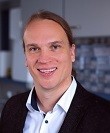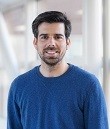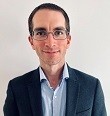 Leo Rasche attended medical school at the University of Würzburg, Germany, followed by a residency in internal medicine and a fellowship in hematology/oncology. From 2016 to 2018, he was a postdoctoral fellow at the Myeloma Institute at the University of Arkansas for Medical Sciences in Little Rock under the supervision of Gareth Morgan and Faith Davies, where he studied medical imaging, tumor genomics, tumor evolution, and immunotherapy approaches for the treatment of multiple myeloma. In 2018, Dr. Rasche returned to Germany, where he is an attending physician at the Myeloma Service of the University Hospital of Würzburg. In 2024, he was appointed full professor of clinical and translational myeloma research. Dr. Rasche has published more than 120 articles in peer-reviewed journals and was awarded the Artur Pappenheim Prize, one of the highest honors of the German Society of Hematology and Oncology.
Leo Rasche attended medical school at the University of Würzburg, Germany, followed by a residency in internal medicine and a fellowship in hematology/oncology. From 2016 to 2018, he was a postdoctoral fellow at the Myeloma Institute at the University of Arkansas for Medical Sciences in Little Rock under the supervision of Gareth Morgan and Faith Davies, where he studied medical imaging, tumor genomics, tumor evolution, and immunotherapy approaches for the treatment of multiple myeloma. In 2018, Dr. Rasche returned to Germany, where he is an attending physician at the Myeloma Service of the University Hospital of Würzburg. In 2024, he was appointed full professor of clinical and translational myeloma research. Dr. Rasche has published more than 120 articles in peer-reviewed journals and was awarded the Artur Pappenheim Prize, one of the highest honors of the German Society of Hematology and Oncology.
 Sebastian Birndt finished his studies in medicine at the University of Jena in 2017 and obtained his doctoral degree in 2022 with a thesis on adult hemophagocytic lymphohistiocytosis (HLH).
Sebastian Birndt finished his studies in medicine at the University of Jena in 2017 and obtained his doctoral degree in 2022 with a thesis on adult hemophagocytic lymphohistiocytosis (HLH).
Currently, he is working as an internal medicine resident and clinician scientist in the department of hematology/oncology at the Jena University hospital. In the future, he aims to specialize in hematology and oncology, combining patient care and clinical research with special focus on optimizing treatment and management of adult HLH.
 Maximilian Merz studied medicine in Heidelberg, New York and Zurich and graduated from the University of Heidelberg medical school in 2012. During his residency and fellowship he specialized on treating patients with plasma cell disorders under the supervision of Professor Hartmut Goldschmidt. He is currently an attending physician in the Department of Hematology and Cell therapy at the University of Leipzig, Germany and responsible for the myeloma program. His translational research group is focusing on single-cell multi-omic studies from asymptomatic over symptomatic to relapsed/refractory disease with a special focus on spatial heterogeneity and novel immunotherapies like bispecific antibodies and CAR T cells. He is furthermore affiliated with the Bioinformatics Group at the Fraunhofer Institute for Cellular Immunotherapies (IZI) in Leipzig to explore new strategies to analyze multi-omic sequencing data. Long-term goal is to better understand evolutionary processes that drive the natural history of refractory plasma cell disorders.
Maximilian Merz studied medicine in Heidelberg, New York and Zurich and graduated from the University of Heidelberg medical school in 2012. During his residency and fellowship he specialized on treating patients with plasma cell disorders under the supervision of Professor Hartmut Goldschmidt. He is currently an attending physician in the Department of Hematology and Cell therapy at the University of Leipzig, Germany and responsible for the myeloma program. His translational research group is focusing on single-cell multi-omic studies from asymptomatic over symptomatic to relapsed/refractory disease with a special focus on spatial heterogeneity and novel immunotherapies like bispecific antibodies and CAR T cells. He is furthermore affiliated with the Bioinformatics Group at the Fraunhofer Institute for Cellular Immunotherapies (IZI) in Leipzig to explore new strategies to analyze multi-omic sequencing data. Long-term goal is to better understand evolutionary processes that drive the natural history of refractory plasma cell disorders.
 Konstantinos Tzelepis is a Principal Investigator at the Cambridge Stem Cell Institute and the University of Cambridge (UK). Prior to this, he was a Wellcome Trust Sir Henry Wellcome Fellow at Harvard University (USA) and the University of Cambridge (UK). He obtained his Ph.D. in Molecular Genetics from the Wellcome Sanger Institute and the University of Cambridge, in 2017, where he developed one of the first genome-wide CRISPR screening platforms for the identification of cancer vulnerabilities and new therapeutic targets. His lab is focusing on the mechanistic understanding and novel therapeutic targeting of RNA and its modifications in disease and ageing. Recently, his group co-developed and characterised the first-in-class RNA methyltransferase inhibitor against METTL3.
Konstantinos Tzelepis is a Principal Investigator at the Cambridge Stem Cell Institute and the University of Cambridge (UK). Prior to this, he was a Wellcome Trust Sir Henry Wellcome Fellow at Harvard University (USA) and the University of Cambridge (UK). He obtained his Ph.D. in Molecular Genetics from the Wellcome Sanger Institute and the University of Cambridge, in 2017, where he developed one of the first genome-wide CRISPR screening platforms for the identification of cancer vulnerabilities and new therapeutic targets. His lab is focusing on the mechanistic understanding and novel therapeutic targeting of RNA and its modifications in disease and ageing. Recently, his group co-developed and characterised the first-in-class RNA methyltransferase inhibitor against METTL3.
 Matthew Blunt obtained his Ph.D. in immunology and pharmacology from the University of Bath in 2013, funded by the BBSRC and Novartis. Following his PhD, he investigated novel treatment strategies for haematological malignancies in the CRUK Centre in Southampton. This work was published in prestigious journals including Blood and Leukemia and also led to the award of the Catovsky Prize from the UK CLL Forum and the John Marsden Prize from the University of Southampton. Dr Blunt then worked with Professor Salim Khakoo on natural killer (NK) cells and the development of novel cancer immunotherapies. In 2018, Dr Blunt received the Postdoctoral Career Track Award from the University of Southampton and in 2019 he was awarded a John Goldman Fellowship from Leukaemia UK to study NK cell recognition of malignant B cells. Dr Blunt now leads a research team utilising primary clinical samples, ex vivo models, and single-cell RNA sequencing to investigate NK cell activation against cancer and to design improved immunotherapeutic strategies. His research group interacts closely with haematologists at the University Hospital Southampton and with international collaborators from both academia and industry.
Matthew Blunt obtained his Ph.D. in immunology and pharmacology from the University of Bath in 2013, funded by the BBSRC and Novartis. Following his PhD, he investigated novel treatment strategies for haematological malignancies in the CRUK Centre in Southampton. This work was published in prestigious journals including Blood and Leukemia and also led to the award of the Catovsky Prize from the UK CLL Forum and the John Marsden Prize from the University of Southampton. Dr Blunt then worked with Professor Salim Khakoo on natural killer (NK) cells and the development of novel cancer immunotherapies. In 2018, Dr Blunt received the Postdoctoral Career Track Award from the University of Southampton and in 2019 he was awarded a John Goldman Fellowship from Leukaemia UK to study NK cell recognition of malignant B cells. Dr Blunt now leads a research team utilising primary clinical samples, ex vivo models, and single-cell RNA sequencing to investigate NK cell activation against cancer and to design improved immunotherapeutic strategies. His research group interacts closely with haematologists at the University Hospital Southampton and with international collaborators from both academia and industry.
 Saad Kenderian is a hematologist and physicianscientist at the Mayo Clinic in Rochester, MN. He has joint appointments in the Division of Hematology, and the Departments of Immunology and Molecular Medicine. He directs a federally funded laboratory focused on cellular therapy, chimeric antigen receptor T (CART) cell therapy, T cell biology, and the development of novel engineered cell therapies for the treatment of cancer and immune-mediated diseases. Over the last three years, three clinical trials, including two multi-center clinical trials, have been initiated based on work developed in his laboratory. He is an author of over 110 manuscripts in the field of CART cell therapy and is an inventor on 25 patent technologies/families. He is the Principal or Co-Principal Investigator on six clinical trials in the field of CART cell therapy.
Saad Kenderian is a hematologist and physicianscientist at the Mayo Clinic in Rochester, MN. He has joint appointments in the Division of Hematology, and the Departments of Immunology and Molecular Medicine. He directs a federally funded laboratory focused on cellular therapy, chimeric antigen receptor T (CART) cell therapy, T cell biology, and the development of novel engineered cell therapies for the treatment of cancer and immune-mediated diseases. Over the last three years, three clinical trials, including two multi-center clinical trials, have been initiated based on work developed in his laboratory. He is an author of over 110 manuscripts in the field of CART cell therapy and is an inventor on 25 patent technologies/families. He is the Principal or Co-Principal Investigator on six clinical trials in the field of CART cell therapy.

